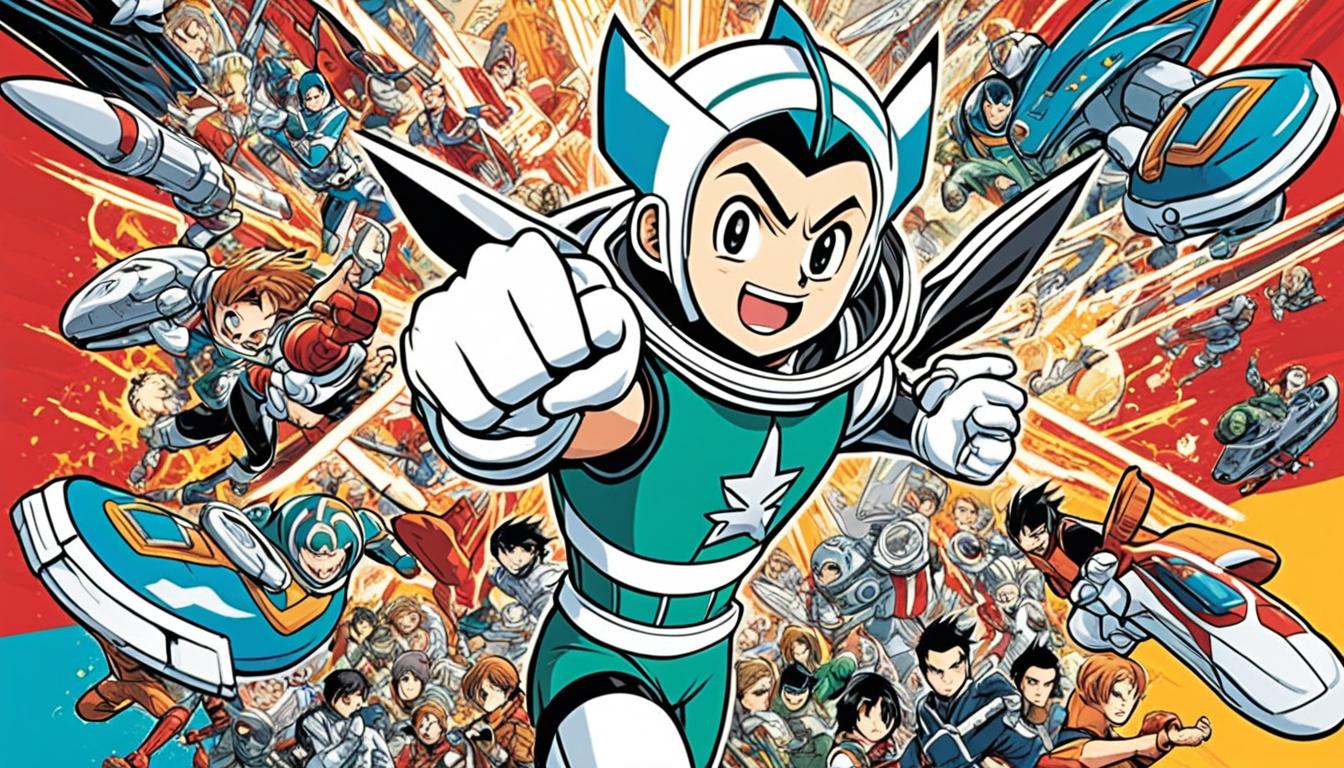Did you know otaku culture has become popular worldwide among the youth? It’s all about a big love for anime, manga, and games. This global craze started with access to media from Japan, inspiring fans all over the world.
Otaku culture is unique because it encourages fans to be creative. It creates a feeling of belonging and friendship through common interests. The movement began in Japan during the 70s and 80s. Now, it’s not just in Japan. You can find special otaku spots in various cities, selling all things otaku.
This culture faces some criticism, but it keeps growing and changing pop culture. It’s like a spark that lights the way for new ideas and projects.
Key Takeaways:
- Otaku culture has gained global popularity due to access to Japanese media.
- It promotes fan creativity through artwork, music, and literature inspired by media.
- Cosplay is a popular creative expression within the otaku community.
- Community and friendships are central to otaku culture’s spirit.
- Despite controversies, otaku culture continues to thrive and impact modern pop culture.
What is Otaku?
Otaku is a term for people deeply into nijigen. Nijigen covers anime, comics, games, and more. Originally from Japan, otaku’s reach now spans the globe. It brings fans together from everywhere.
In Japan, whole parts of cities are otaku-friendly. You’ll find stores stocked with anime goodies, comics, and games. The country accepts and loves its otaku fans, enjoying their creativity and passion openly.
Otaku fans show their love in many ways. They make art, music, and stories based on their favorites. Dressing up as their beloved characters, known as cosplay, is very common.
The many interests of otaku culture give rise to various categories. Manga, pop idols, PC games, and more each have their fanbase. This shows the wide scope of otaku interests.
While starting in Japan, otaku culture has gone worldwide. Other countries now host anime and cosplay gatherings. These events let fans meet, share, and enjoy their love for nijigen.
Despite some bad press, otaku culture does well globally. There are millions of fans who love anime, manga, and more. They create online communities and make friends through their shared passion.
| Year | Key Events |
|---|---|
| 1983 | Otaku were first defined in a 1983 essay by Akio Nakamori in the manga magazine Manga Burikko |
| 1989 | The negative connotations of the term otaku were solidified when the serial killer Tsutomu Miyazaki was apprehended |
| 2016 | Japanese pop culture exploded into the worldwide mainstream, driven by manga, anime, and gaming |
Otaku culture has changed, from negative beginnings to inclusive fandom. Fans of all kinds unite, creating fun spaces for friendship and discussion.
It’s a colorful, creative world for fans of anime, comics, and games. Otaku has changed how we connect with media. And, it’s making its mark on the world’s entertainment scene.
The History of Otaku
Otaku culture began in the 1970s and 1980s in Japan. A new group of fans got together. They loved anime, manga, and other entertainment. They formed small, tight groups to share their joy.
These fans made their own fanzines, comics, and art to show their love. The culture quickly grew, becoming popular in Japan.
“Fandoms were often small and tight-knit, with fans creating their own fanzines, comics, and fan art.”
In the 1990s, personal computers and the Internet changed everything. Fans could now connect worldwide. This led to the birth of online communities centered on anime, manga, and games.
These online spaces became a meeting point for otaku fans everywhere. They allowed fans to share, create, and discuss together. This built a strong sense of community and friendship.
Today, otaku culture is bigger than ever. A huge global community loves anime, manga, and games. It has become a worldwide passion, uniting fans across different countries.
Otaku culture is influencing art, media, and more. The creativity of fans is shaping the world of anime and manga. Their fan works and ideas are making a big impact.
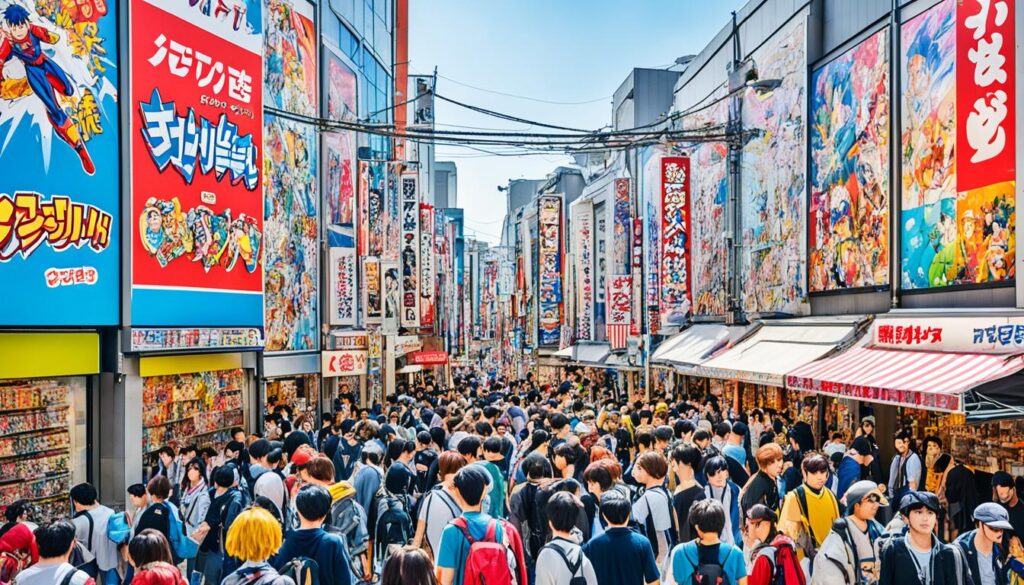
The community and friendships in otaku culture are special. People find happiness and friendship by celebrating their favorite entertainment. This happens at conventions, online, and in local groups.
As otaku culture spreads, it’s clear it’s changing the world. Both Japan and the global culture scene have felt its positive impact.
Controversy Surrounding Otaku
Otaku culture has fans worldwide and has influenced our pop culture. Sadly, in the 1980s, some big crimes put otaku fans in a bad light. This got lots of attention from the media and authorities. People started seeing otaku culture in a not-so-great way back then.
There are some who think otaku culture is not good. They say it leads to unhealthy obsessions and being alone. They point out how some fans treat female characters in games and cartoons as objects. This has made people worried about what otaku culture might do to society.
“Otaku culture promotes unhealthy obsessions and social isolation, often objectifying women through various elements,” says a critic. “This subculture needs to be addressed and discouraged.”
But, some stand up for otaku culture. They say it actually helps with mental health. Being part of a tight-knit group with similar interests can make you feel understood and supported. And for some, anime, manga, and games are a way to take a break from everyday life and deal with stress.
Lately, people in the otaku community have been talking more about the good and bad sides of their culture. Some feminist critics have pointed out issues they care about. Many wonder if otaku culture can be aligned with feminist views.
It’s worth mentioning that the otaku community isn’t all the same. People have different opinions within this group. But, most otaku fans want to see gender equality more in the media they enjoy.
So, otaku culture has had its fair share of troubles and bad opinions. While some think it’s not good for people and that it treats women badly, others see its benefits. The ongoing discussion reflects how different people see otaku culture.
Teaching About Otaku Through Youth Culture
Otaku culture in Japan started growing in the 1970s and 1980s. Now, it’s a big deal, with around 100,000 dedicated fans. This number could be as high as a million. These fans love manga, anime, and games, sparking new books, films, and art.
Some worry that otaku culture shows young people are too into themselves. But this culture also shows how money, tech, and media affect Japan’s youth. It’s a hotbed for new ideas and a sense of belonging for many.
What makes otaku culture cool is how it grabs young people’s attention. It’s a place where they can be creative. Fans make their own art, music, and stories about their favorite anime and manga. It’s a way for them to show how much they love these forms and meet others like them.
“Otaku culture serves as an indicator of the impact of affluence, technology, and the media on young Japanese.”
Otaku fans are also big on pushing fresh ideas and tech. Their passion spreads even outside Japan. People from all over the world join in, creating a global community that welcomes everyone.
Teaching otaku culture is a great idea. It lets young people dive into something they love. Schools and clubs can host activities focused on manga, anime, and games. Here, they can show off their creative skills and connect with others who love otaku culture too.
Benefits of Teaching About Otaku:
- Encourages creativity and self-expression
- Fosters a sense of community and belonging
- Promotes critical thinking and analysis
- Provides a platform for cultural exchange
- Engages young people through their interests
By bringing otaku culture into schools, educators inspire their students. It’s a key way to get kids excited about learning. This way, otaku culture becomes more than a hobby. It becomes a valued part of modern culture for young people.
The Otaku Lifestyle
The otaku lifestyle is all about a deep love for anime, manga, and games. Fans enjoy getting lost in stories and connecting with others who share their passion. This love creates a sense of belonging and friendship among those who love these forms of Japanese pop culture.
Fandoms are central to the otaku lifestyle. They unite fans of specific anime or franchises. Through online platforms, fans can join discussions and celebrate what they love with others. It’s a way for otaku to find and engage with a wide community of fans.
Anime Fandoms and the Power of Connection
Fandoms are key to connecting otaku socially. They offer a place for exchanging thoughts, ideas, and fan creations. This shared excitement about favorite anime series helps fans connect. They enjoy discussing storylines and characters together, building a sense of friendship and support.
“The anime community is like a big family. We may come from different backgrounds, but our love for anime brings us together and creates lasting friendships.” – A devoted otaku
Character tropes also play a role in community building. Tropes are common themes or character types in anime. They help fans choose what to watch based on their favorite kinds of characters. Whether fans like the upbeat hero or the clever friend, tropes guide their anime choices.
Enter the World of Anime Conventions
Anime conventions are a big part of an otaku’s life. These events attract thousands of fans every year. They offer a mix of activities like cosplay, artist alleys, and industry talks.
“Anime conventions are like stepping into a different world. It’s a place where you can be yourself, express your creativity, and feel accepted without judgment.” – An enthusiastic otaku
At these conventions, otaku can let their passion shine. They wear their favorite characters’ outfits, look at fan art, and share their love for anime. It’s a chance to meet others who feel the same way about Japanese pop culture.
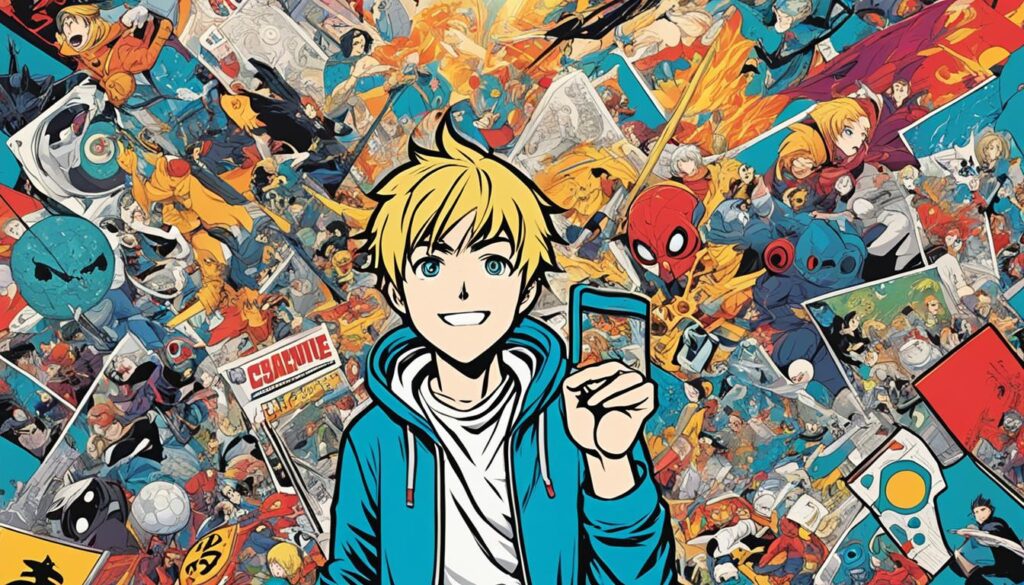
| Benefits of the Otaku Lifestyle | Impact on the Community |
|---|---|
|
|
The otaku lifestyle is about creativity, making friends, and sharing experiences. It doesn’t matter where you’re from; anime, manga, and gaming bring us together. As this culture keeps growing, its positive effect on fans and communities will only increase.
The Value of Fandoms
Fandoms in the otaku culture let people connect with others who love the same things. This could be by talking about favorite characters or digging into storylines. They create a feeling of community and friendship. A deep love for anime and manga makes it easy to start conversations and meet others. Fandoms even help friends bond over past beloved shows.
Being in a fandom means a chance to make friends who truly get you. Those who share your passion are likely to connect deeply. It makes for a space where everyone feels welcome and included. Together, they celebrate their favorite anime, manga, or game.
Fandoms are also great for diving into detailed discussions and debates. Fans get to share what they love most about their favorite shows. They learn from each other’s viewpoints, which can expand their own. This leads to deeper thinking and richer conversations about the media they enjoy.
Plus, fandoms are hubs for getting creative. Fans can show off their art, writing, or cosplays. Getting feedback from others boosts their creativity. This back-and-forth drives innovation and keeps the community growing.
“Fandoms are a testament to the power of shared interests and the joy of building connections through a mutual love for a particular anime, manga, or game.” – Pat Metheny
Fandoms do more than offer fun. They become a big part of who you are. They help people feel accepted and part of something special. In a fandom, everyone’s voice matters, and they feel valued.
In the end, fandoms are key to the otaku culture. They bring friends together. They encourage creativity and personal growth. They unify people with shared passions in a way that overcomes all boundaries.
The Role of Tropes in Anime
In anime, tropes shape stories and draw viewers in. Tropes are patterns like character types and common themes. They make anime familiar yet unique, helping fans pick shows they’ll like.
Tropes act as a cheat sheet for what fans might enjoy. People quickly spot what they prefer in a series. For example, a “hero’s journey” or a “magical girl” story helps fans feel at home in the show.
Although tropes can seem repetitive, they add depth to tales. For instance, a “tragic hero” or an “amnesiac protagonist” lets creators dive into deep feelings. This adds emotional layers to anime that touch viewers deeply.
Tropes also fuel anime fan discussions, highlighting the otaku culture. Fans love to talk about their favorite series’ tropes. This shared passion for anime builds a community. People connect over character arcs, plot twists, and big themes.
Examples of Tropes in Anime:
- The “Hero & Villain Team-Up” makes stories like Bungou Stray Dogs and Attack on Titan rich. It mixes good and evil in a refreshing way.
- In tales like Jujutsu Kaisen and The Irresponsible Captain Tylor, the “Accidental Hero” makes stories more relatable. It changes expectations about a hero’s journey.
- Anime like Cowboy Bebop and Chainsaw Man sometimes offer sad endings. This breaks from happy endings, making narratives more real and unpredictable.
- In Katanagatari and Sword of the Stranger, “Silent Showdowns” are different. Battles focus on movement and emotion, not words, pulling viewers in.
- Shows like Berserk and Darker than Black use “Morally Gray Protagonists.” Characters like Guts and Hei’s actions make viewers think. They offer complex, fascinating stories.
Tropes are key to anime’s success. They guide viewers and inspire creative stories. Fans and their love for discussing anime tropes form a lively otaku community.
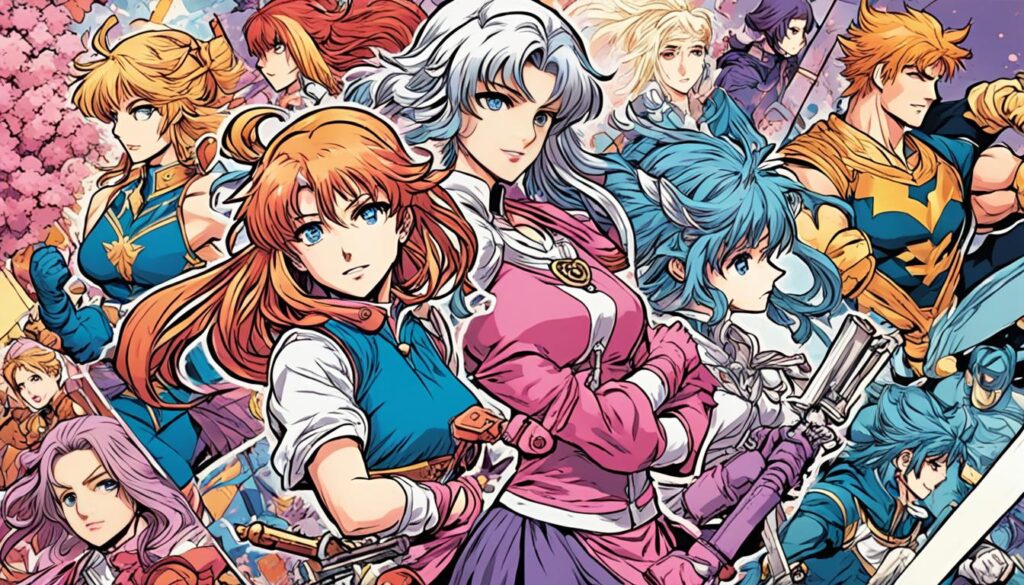
The Sense of Community at Anime Conventions
Anime conventions are a welcoming place where fans, known as otaku, gather. They come together in a loving and open hearted atmosphere. Here, fans express their love for anime, cosplay, and other parts of Japanese pop culture.
At these conventions, attendees get to talk with others who share their enthusiasm. This open setting inspires fans to make friends and share ideas. They have fun discussing their favorite shows, sharing art, or joining in cosplay events. It’s a fantastic and welcome space for otaku to show who they are.
This feeling of togetherness at anime conventions is truly unique. People from different backgrounds meet to share their love and appreciate the creativity around them. Everyone feels valued and understood; there’s no worry of being judged.
Also, the positive and inclusive vibes help make these events exciting. Attendees can dress up as their beloved characters and proudly show their passion. Admiring other’s costumes can be awe-inspiring and bring fans closer together.
These events create deep bonds within the otaku community. Fans build real connections, find friends, and a place they belong. They share their excitement over shows, analyze character development, and make unforgettable memories together.
| Key Aspects of Anime Conventions | Benefits for Otaku Community |
|---|---|
| Anime conventions promote open conversations and interactions | Encourages attendees to connect and form friendships |
| Provide a platform for otaku community members to share their passion | Opportunities to showcase artwork, talent, and creativity |
| Host diverse programming and events catering to a wide audience | Engage attendees with their passions through panels, workshops, and contests |
| Offer a welcoming and inclusive environment | Create a safe space for fans to express themselves without judgment |
Overall, anime conventions are crucial in uniting the otaku community. These gatherings let fans share their love for anime and cosplay. It’s a safe and open place for everyone to celebrate and enjoy. By bringing fans together, these events make the community stronger and help Japanese pop culture thrive.
The Escapism of Anime
Anime is a powerful medium. It lets viewers dive into worlds that are vibrant and visually stunning. This is a great escape from reality. Anime tells captivating stories and uses unique art to make worlds that are full of excitement and wonder.
One big reason anime is so good at escaping is its look. The animation is top-notch, full of life and color. It makes the characters and places come alive. When you watch, you feel like you’re in a beautiful, new place.
There’s also how anime tells stories. It can share all kinds of tales, from simple to deep. These stories and the characters stick with you. They make you think about life outside the screen.
Music in anime is a big deal too. It makes the stories and scenes feel deeper. The songs from anime are often catchy and heartfelt. They can make you feel all sorts of emotions.
How anime develops its characters is another reason why people love it. The characters feel real and have stories you can connect with. You end up caring a lot about what happens to them.
Anime can also teach you about Japan’s culture. It shows things like traditional games and theater. This makes the worlds in anime even more interesting and rich.
In the end, anime’s power to take us away from real life is amazing. It does this with its beautiful looks, great stories, and many other things. Anime gives people a break and a chance to be somewhere different for a while.
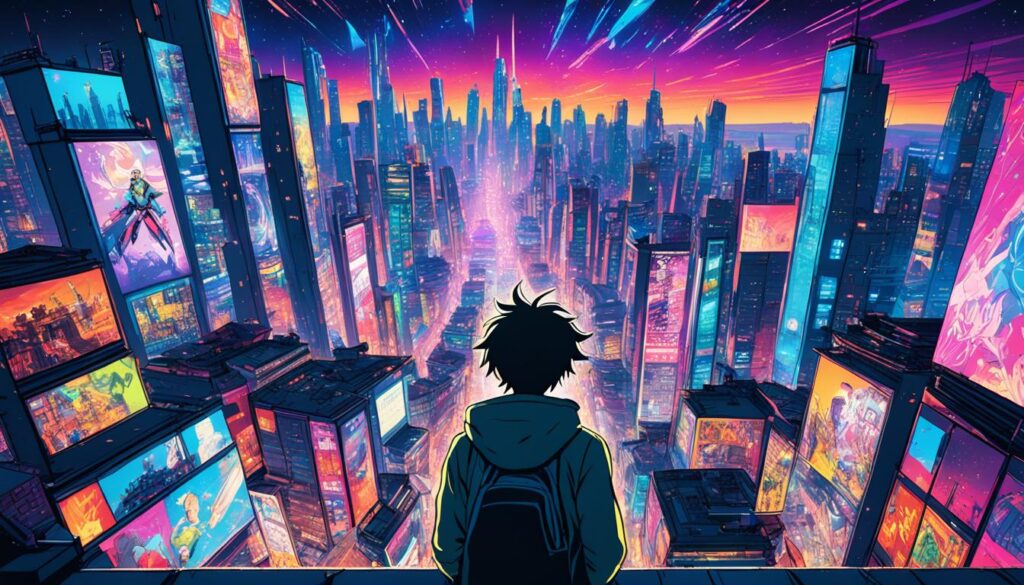
Statistical data related to the topic “The Escapism of Anime” from the article “The Creative Spirit of Otaku Culture”:
| Statistic | Data |
|---|---|
| Anime’s Global Popularity | Anime has captured the hearts of millions globally, showcasing its widespread popularity. |
| Diverse Genres | Anime offers a diverse range of genres, reflecting the broad appeal and variety within the medium. |
| Social Bonding | Anime fosters social bonding among fans, indicating a strong sense of community and engagement. |
| Escapism and Relaxation | Anime serves as a form of escapism and relaxation for viewers, highlighting its role in providing a break from reality and reducing stress. |
| Unique Art Style | Anime’s unique art style sets it apart from other forms of animation, reflecting its creative expression and artistic innovation. |
The Impact of Otaku Culture
Otaku culture started in the 1960s as a geek sub-culture in Japan. It was not seen in a positive light at first. Over the next forty years, it changed significantly and made its mark on society across the globe. It has influenced the worlds of art, community, and innovation. Otaku has changed how we enjoy popular entertainment. The love and creativity of otaku fans have brought many new artworks, music, and stories. These have greatly enriched the worlds of anime and manga.
The community formed by otaku is truly outstanding. Often, otaku folks are shy or introverted, but they find friends online. They come together over their love for comics, anime, and computers. In these communities, they can freely share their love for this special kind of entertainment.
Otaku culture has also inspired innovation. With the Internet, otaku fans found a way to connect widely and share their creations. Websites, illustrations, and computer graphics became common. This changed how stories are told. It also made it easier for their culture to spread worldwide.
The creative spirit of otaku has given rise to a plethora of fan artwork, music, and literature that enrich the world of anime and manga.
Based on their interests, otaku culture has seen several generations. But what unites them all is their love for anime, manga, and games. This shared passion has built a subculture that influences mainstream culture today.
But otaku’s impact isn’t only felt in Japan. It has become beloved all over the world, particularly among young people. Through the Internet, fans everywhere can access Japanese media. Anime fests and cosplay events outside Japan show how much people everywhere love otaku culture. Even in Japanese cities, areas are set aside for otaku, where fans can buy all sorts of things related to their favorite anime, comics, and games. The vast support from fans globally shows the huge impact of otaku culture on entertainment.
In conclusion, otaku culture has greatly influenced art, creation of communities, and innovation. Thanks to its creativity and passion, it has led to new forms of art, strong communities, and significant progress. This culture shows how subcultures can make a real difference and bring people from different parts of the world together.
The Global Phenomenon of Otaku Culture
Otaku culture got its start in Japan in the 1970s and 1980s. Now, it’s a hit around the world. Its colorful anime and manga draw in millions of fans. It connects people from different cultures through shared stories and feelings.
Anime and manga are at the heart of otaku culture. They now have fans from all corners of the globe. These fans meet up at events celebrating Japanese pop culture. This shows how far otaku culture has spread, creating global friendships.
In Japan, there are special areas full of anime goods and more. These spots are heaven for otaku, letting them dive deep into their interests.
Fans don’t just watch, they get creative. They make art, music, and stories based on their favorite shows and books. Dressing up as characters, or cosplay, is another fun way they share their love.
Otaku culture has gone global, influencing the world’s entertainment scene. Now, many countries hold their own anime and cosplay events. This growth proves the wide appeal of their world, bringing people closer together.
Today, otaku culture is no longer a small community. It’s a worldwide hit, loved for its art, stories, and unity. It’s a major player in entertainment, showing how powerful it is in connecting us all. Through a love for anime and manga, people from everywhere find common ground.
Conclusion
Otaku culture is full of vibrant creativity. It has enchanted millions worldwide. From anime to manga and gaming, it brings a diverse group together. This community lets fans celebrate their favorite entertainment without judgment.
The love in otaku culture goes far. Fans don’t just watch, read, and play. They create their own art, music, and stories. They’ve even boosted technology. This global force ties people together in a way few things can. It shows that shared passion knows no cultural limits.
Otaku influence goes beyond fun stuff. It affects our whole world, shaping how we see things. Its heart is in creativity, inspiring people worldwide to express themselves. This movement highlights the power in following what you love. And it champions new ideas and the courage to be different.
FAQ
What is otaku culture?
Otaku culture is loved around the world for its passion for anime, comics, and games. It started in Japan in the 1970s and 80s. Today, it’s a hit with young fans across the globe.
What is an otaku?
An otaku is someone who really loves anime, manga, and games. Originally from Japan, now the love for these two-dimensional worlds is everywhere.
What is the history of otaku culture?
It all began in the 1970s and 80s when fans in Japan fell for anime and manga. They swelled in number as PCs and the Internet arrived in the 90s. These fans formed big online groups for anime and games.
Has otaku culture faced any controversy?
Yes, it faced bad times, like in the 80s with some criminal cases. People used to worry a lot about otaku culture. But some say it’s actually good for happiness and health.
What is the otaku lifestyle?
The otaku way of life is about love for anime, manga, and games. Fans meet up in groups to share what they love. They also enjoy dressing up as their favorite characters, called cosplay.
How do tropes play a role in otaku culture?
Tropes act like a secret code to guess what fans will like in anime. They include familiar themes and characters. Tropes can start fun talks or arguments among fans, making otaku culture lively.
What can one expect at anime conventions?
Anime conventions are fun and welcoming events. They’re a space where fans can be open about their love for anime, cosplay, and other aspects of Japanese culture. Here, people swap ideas, art, and cool stuff, making everyone feel included.
How does anime provide escapism?
Anime is a way to escape into worlds full of color and wonder. These stories and art take fans away from their everyday life, if only for a little while. With its engaging tales and eye-catching style, anime lets viewers dive into a whole new world, away from their own.
What impact does otaku culture have?
Otaku culture has changed art, community, and how we share our ideas. Fans make cool stuff like art and music, adding to the anime and manga world. They also bring people together. Plus, they’ve helped spark new tech and ways to tell stories, bringing cultures together.
Is otaku culture a global phenomenon?
Absolutely, otaku culture has spread far beyond Japan, winning over millions. Now, fans from around the world celebrate at events and join together in their love for anime. Its huge following shows how it brings people together, no matter where they’re from.
